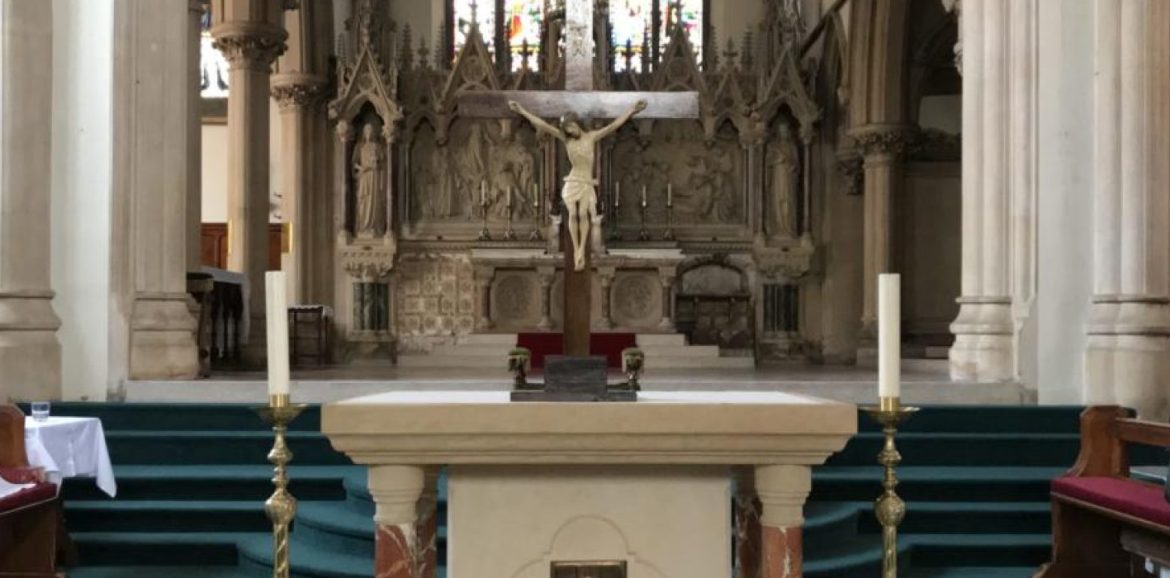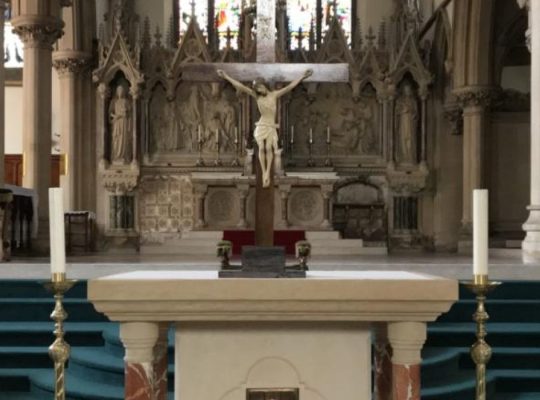The first reading for this Sunday consists of two passages from the Book of Isaiah: the announcement of a prophet sent by God to bring the good news to the poor and to proclaim a year of favour and a cause for rejoicing among the people. ‘The Spirit of the Lord has been given to me, for the Lord has anointed me. He has sent me to bring good news to the poor, to bind hearts that are broken…..’
When hearing this reading, one immediately thinks of the first time Jesus preached, in the synagogue at Nazareth. On that day, having read this passage, he closed the book and said: ‘Today this Scripture passage is fulfilled in your hearing.’ There is justification for the Christian interpretation of this scriptural passage. We cannot determine with certainty who the prophet was that pronounced it, but Gospel and Christian traditions have seen in it the figure of the Messiah to come, the announcement of Jesus—the Anointed One —i.e. the Christ of the Lord God. This interpretation is not only sound: Scripture itself — the Gospel According to Luke— and the Church, under the power of the Spirit, give it the ring of authority.
But the earthly coming of the Messiah cannot be disassociated from the coming of the Lord at the end of time. The prophecy of the Book of Isaiah must be read according to this dual perspective, above all in the context of the liturgy of Advent. The ‘year of favour from the Lord’ was inaugurated when Jesus appeared. ‘Today this Scripture passage is fulfilled,’ but it will be truly consummated when the Lord returns.
The recipients of the good news that the Anointed One of the Lord God is to announce— who are ‘the poor,’ ‘the broken hearted,’ ‘the prisoners and captives?’ The first term inspires the others and explains them. The theme of the ‘poor of Yahweh—anawim — is basic in the Old Testament and is found in all its richness in the New Testament. Etymologically, the Hebrew word for ‘poor’ means ‘bowed down,’ an attitude of humble submission. The ‘poor of Yahweh’ stand before God, whose benevolent kindness they recognise, whose mystery they adore, and for whom they wait with utter confidence. It is the cry of these poor—the persecuted, afflicted, and unfortunate— their form of prayer and protestation that we often hear in the psalms. As friends and servants of God, they can count on him. It is to them that the kingdom of heaven belongs, as Jesus proclaims in calling them ‘blessed.’ These ‘poor’ are, by definition, those who constitute the people of God.
This people of the ‘poor,’ when given the good news, ‘leap for joy’ in the Lord; they ‘exult’ in God their Saviour.
In order to express this joy accurately, the Greek translation of the Old Testament used a word unknown in classical language. They wanted to express an outburst of joy that breaks forth in song, music, and dancing—an exultation, a trembling under the intoxicating breath of the Spirit. It is a complete celebration because God breaks in to make it so, to transform it. ‘He has clothed me with a robe of salvation, and wrapped me in the mantle of justice, like a bridegroom adorned with a diadem, like a bride bedecked with her jewels.’ It is difficult to express in words this enthusiasm that, slowly but surely, wins over all the nations who are called to the same praise, insofar as they benefit from the year of favour granted by the Lord.
No chant is more appropriate here than the Magnificat. It is the canticle not only of Mary but of all the ‘poor’ that God calls together. Every word of the Magnificat, woven with biblical memories, can be sung by the Church, the pilgrim people that works to bring about a new evangelical order. For it to become our song of thanksgiving, we must be moved by the same sentiments that moved the heart of the Virgin. ‘May the soul of Mary dwell in you to glorify the Lord; may the spirit of Mary dwell in you to exult in God!’ By singing it, our soul is filled with these sentiments. In this way we prepare ourselves to receive anew the One who has come and continues to come, so that our joy may be perfect: ‘My soul glorifies the Lord, my spirit rejoices in God my saviour.’
After his entrance onto the scene last week, our Gospel this week turns to the Precursor — the one who leapt in the womb of Elizabeth — the one who heard Mary proclaim the Magnificat even whilst still in his mother’s womb. Beyond his historical role, John the Baptist is the one whose person and preaching continues to prepare us for the coming of the Lord. It is significant that, in the great and densely packed prologue of the Fourth Gospel, we read a phrase about the Precursor and, immediately following, his firm witness to Jesus.
We notice immediately the solemnity of this introduction to the Precursor: ‘There was a man named John sent by God,’ parallel to that of the first verse, ‘In the beginning was the Word.’ The evangelist John, like Luke, Mark, and Matthew, especially Luke, shows the Precursors relation to the Son of God made flesh. He does this in the prologue, thus underscoring the importance of the Baptist’s mission in the mystery of salvation that the Son has accomplished, he ‘who is in the bosom of the Father’ and ‘has brought us to know him,’ he through whom ‘we have received grace upon grace.’
The hierarchy is well defined between Christ and the Baptist, whose dignity is nonetheless affirmed. ‘He himself was not the light,’ but he came ‘as a witness to testify to the light, so that through him all men might believe.’ Truly, ‘history has not known a man born of a woman greater than John the Baptist.’ He is, moreover, unequaled as a model for believers who, with their own vocations, have given witness to the Light ‘that all might believe’ in the Lord.
What John the Evangelist wants to say, in presenting the man sent by God whose name was John, does not only correspond to the manner in which Christians have understood the mission of the Baptist; he has, in fact, without the slightest ambiguity, declared who he was. And he has testified to John the Baptist in a manner that almost seems like an official inquest.
We should not be surprised that the priest’s and the Levites sent messengers from Jerusalem to interrogate John. It was incumbent on them to pass judgement on the man and his mission and on the meaning and authenticity of what he was doing. They were careful however, not to pronounce judgement based on their first impressions. Authority in the Church works similarly. It intervenes in situations when people give themselves permission to follow certain opinions uncritically, and thus being led astray.
In John the Baptist’s testimony, he cuts short any false notions: ‘I am not the Messiah.’ The response is decisive: ‘I am not Elijah,’ who some thought would come again to anoint and manifest the Messiah, although John may indeed have come, as Luke says: ‘In the spirit and power of Elijah.’ Finally, one last denial: ‘Are you the prophet?’ ‘No’ But what does he mean?
The title ‘prophet’ occurs twice in the Fourth Gospel. After the multiplication of the loaves, ‘When the people saw the sign he had performed they began to say, ‘this is undoubtedly the Prophet who is to come into the world.’’ Again, some of those who heard his teaching in the Temple said: ‘This must be the prophet.’ He is easily mistaken for the Messiah. We can then understand that John responds: ‘I’m not he.’
There must have been a certain irritation in these responses, but John endured these cases of mistaken identity. Far from being naive or sullen, or keeping others in doubt, he almost angrily, at least sharply, responds with a vigorous ‘No’ to those who take him for someone else. To those who press him to give a positive response, he offers a text from Isaiah: ‘I’m a voice in the desert, crying out: make straight the way of the Lord.’ Thus, he is placed in relation to an Other, whose servant Precursor he is, an Other whose name we know Jesus. Although we hear a great deal about John the Baptist in todays Gospel, we should never stray from the central character of the narrative— the Lord himself. From John’s ministry and baptizing to Jesus’s ministry, there is continuity and forward motion. The relation is that of witness to the Light and the Light itself. John was explicit: ‘There is one to come after me, the strap of whose sandal I am not worthy to unfasten.’
The season of Advent is a parable of the life of the Church and of each believer, hoping in joy and humility for the hour of the great rendezvous. It is the time when eyes are uplifted to the One who dispenses all gifts in unpredictable ways; the time of spiritual joy for those who do not obstruct the Spirit and misunderstand the prophets; the time when one looks ahead to the coming of God.
It is also the time for praying that God himself, by the coming of his Son, may inaugurate his reign and help us to reduce the distance that always exists between the little that we are and all that God has in store and prepares for us. It is the time when we awaken to God by opening our hearts and awakening the very centre of ourselves that listens and, already secure in his mercy like a child in the love his parents, gives thanks at all times.
‘My soul magnifies the Lord, my spirit rejoices in God my Saviour.’


